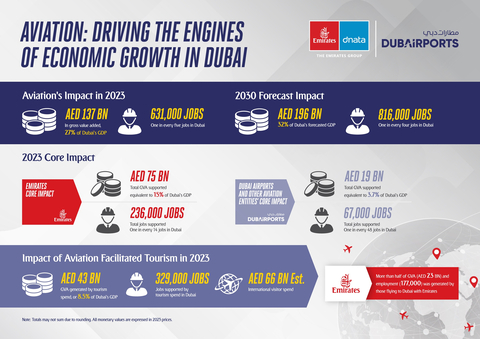- The aviation sector supported 27% of Dubai’s GDP in 2023, with an economic contribution of AED 137 billion (USD 37.3 billion) – which is set to rise to almost a third of Dubai’s GDP by 2030. The total aviation sector impact includes the sector’s core impact as well as the catalytic impact of aviation-facilitated tourism
- The aviation sector supported over 630,000 jobs in 2023 and is forecasted to add another 185,000 jobs by 2030
- The catalytic impact of tourism facilitated by aviation contributed AED 43 billion (USD 11.8 billion) to the local economy in 2023, with its GDP contributions expected to grow by more than 40% by 2030
DUBAI, United Arab Emirates--BUSINESS WIRE--
Emirates Group and Dubai Airports have today released an economic impact study that reaffirms the central role aviation plays in Dubai’s economy, by quantifying its contributions and forecasting the sector’s upwards trajectory, based on financial and passenger growth projections for the sector.
This press release features multimedia. View the full release here: https://www.businesswire.com/news/home/20241023320236/en/

Aviation Economic Impact on Dubai Infographic (infographic: AETOSWire).
The study, compiled by global research firm Oxford Economics, includes an assessment of direct economic activity generated by the aviation sector, indirect activity generated through the sector’s supply chain, and induced activity supported through wage-funded consumption by the local aviation workforce. The study also assesses the catalytic impact of tourism spending facilitated by the aviation sector in Dubai.
His Highness Sheikh Ahmed bin Saeed Al Maktoum, Chairman and Chief Executive, Emirates Airline & Group, and Chairman of Dubai Airportssaid: “Under the leadership of HH Sheikh Mohammed bin Rashid Al Maktoum, Dubai’s aviation sector has been a core pillar of our city’s economic growth strategy to date, and it will continue to play a key role in the D33 Economic Agenda.
“Supported by strong air connectivity, Dubai has a prominent presence on the global stage for trade, investments, tourism, and is a leading player in aviation and logistics. Our ambitious plans for Dubai World Central – Al Maktoum International airport, and our ongoing investments to expand capacity at Dubai International, will unlock further economic opportunities by supporting the projected demand for air transport. Our growth plans will generate even more skilled jobs, and also help drive innovation as we work with leading technology partners to develop future solutions to enhance travel experiences and make operations more efficient and secure.”
Aviation sector’s contribution to Dubai economy
In 2023, Dubai’s aviation sector, consisting of Emirates Group, Dubai Airports (including Dubai International and Dubai World Central - Al Maktoum airports), and other aviation sector entities¹ are estimated to have supported AED 137 billion (USD 37.3 billion) in gross value added² (GVA), equivalent to 27% of Dubai’s GDP. This included the core economic impact of AED 94 billion, and AED 43 billion from the catalytic impact of aviation-facilitated tourism. These figures are projected to increase steadily, with aviation activities facilitated by Emirates and Dubai Airports contributing AED 196 billion, or 32% of Dubai’s forecasted GDP by 2030 (in 2023 prices).
Aviation-led activity also accounted for 631,000 jobs across Dubai, equivalent to one in five jobs in the emirate in 2023. A further 185,000 aviation-linked jobs are expected to be created by 2030, with the total number of jobs supported by Dubai’s aviation sector forecast to grow to 816,000 jobs.
A previous economic impact report released by Oxford Economics in 2014 found that the aviation sector contributed 27% of Dubai’s GDP and supported 417,000 jobs. While the latest results indicate the share of Dubai’s GDP has remained stable, the sector’s gross value added has increased in real terms, with the current figures reflecting faster growth across other sectors, as well as diversification in the wider economy over the past decade.
Dubai’s vital investment to futureproof its aviation sector and ensure it remains an economic driver, is evident in ongoing major investments to expand capacity and operations at Dubai International, in addition to a new generation facility at Dubai World Central - Al Maktoum International. The new AED 128 billion airport will be five times the size of Dubai International, with the first phase to be completed in 10 years. When fully completed, Dubai World Central - Al Maktoum International will consist of over 400 aircraft stands, with capacity to serve 260 million passengers annually. The expansion of Dubai World Central - Al Maktoum International is not included in the study’s main impact results³; however, the construction project is expected to contribute an estimated AED 6.1 billion to Dubai’s GDP in 2030, as well as support 132,000 jobs.
The new airport and surrounding infrastructure will contribute to Dubai’s Economic Agenda (D33), which aims to strengthen the emirate’s trade and tourism footprint. D33’s progressive development plans also seek to make Dubai one of the most connected cities by adding 400 destinations to its foreign trade map, in addition to making it one of the top five logistics hubs in the world.
Aviation and tourism in Dubai
Aviation is also the driving force behind the growth of international tourism to Dubai. As one of the most frequented destinations in the world, visitors stayed an average of 3.8 nights in 2023⁴, spending an average of AED 4,300⁴ on hotels, restaurants, attractions and shopping. According to the report, international visitors flying to Dubai spent an estimated AED 66 billion last year.
In total, aviation-facilitated tourism spending is estimated to have contributed: AED 43 billion in gross value added, or 8.5% of Dubai’s GDP, supporting 329,000 jobs. More than half of GVA, AED 23 billion, was generated by those flying to Dubai with Emirates. Tourism to Dubai is projected to grow significantly over the next six years, with aviation-facilitated tourism spending expected to support AED 63 billion in gross value added, equivalent to 10% of Dubai’s projected GDP, as well as one in eight Dubai jobs.
The full Oxford Economics report ‘The Economic Impact of Aviation In Dubai’, can be found at: [link]
Please click here to view the newspage.
¹ Other aviation entities include flydubai, Dubai Duty Free, Dubai Aviation Engineering Projects (DAEP), Dubai Police, Dubai Customs, Dubai Immigration, Dubai Air Navigation Services, Dubai Civil Aviation Authority, the General Directorate of Residency and Foreigners Affairs (GDRFA), and Dubai Aviation City Corporation.
² Gross Value Added (GVA) is defined as the sum of compensation of employees and earnings before interest, taxes, depreciation, and amortisation (EBITDA). It is also equal to revenue minus the cost of bought in goods and services used up to produce that revenue. Summed across all firms in an economy, and after small adjustments for taxes and subsidies, GVA is equal to GDP.
³The Al Maktoum Airport (DWC) expansion announced in April 2024 is not included in the impact forecast. The DWC expansion would contribute an estimated AED 6.1 billion in gross value added to the economy in 2030, equivalent to 1.0% of Dubai’s forecasted GDP; and generate 132,000 jobs, equivalent to 3.7% of Dubai's employment in that year.
⁴Based on Dubai Tourism 2023 Performance Report (link)
*Source: AETOSWire
View source version on businesswire.com: https://www.businesswire.com/news/home/20241023320236/en/
Contact details:
Rula Tadros, +971566848854
[email protected]


